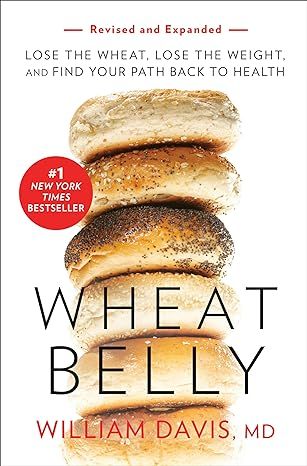Wheat Belly (Revised and Expanded Edition): Lose the Wheat, Lose the Weight, and Find Your Path Back to HealthKindle
4.6
-
2,034 ratings
#1 NEW YORK TIMES BESTSELLER • The groundbreaking phenomenon that kick-started the grain-free movement, now revised and expanded with the latest nutritional and scientific research findings!
“One of the most impactful nutrition-based books of modern times.”—David Perlmutter, MD, #1 New York Times bestselling author of Grain Brain
First published in 2011, Wheat Belly introduced the world to the hidden dangers of modern wheat and gluten, revolutionizing the conversation around health and weight loss forever. Nearly a decade later, Dr. William Davis’s provocative indictment of the dominant staple in our diet continues to inspire countless people to “lose the wheat.” After witnessing thousands of patients regain their health after giving up wheat, Davis reached the disturbing conclusion that wheat is the single largest contributor to the nationwide obesity epidemic—and its elimination is key to drastic weight loss and optimal health. In Wheat Belly, Dr. Davis provides readers with a user-friendly, step-by-step plan to navigate a new wheat-free lifestyle. Now updated with refreshed recipes, new program guidelines, and cutting-edge nutritional findings, Wheat Belly is an illuminating look at what truly is making Americans sick and an action plan to clear our plates of this harmful ingredient.
Kindle
$8.99
Available instantly
Paperback
$11.46
Spiral-bound
$25.01
Ships from
Amazon.com
Payment
Secure transaction
ISBN-10
1984824945
ISBN-13
978-1984824943
Print length
400 pages
Language
English
Publisher
Rodale Books
Publication date
December 09, 2019
Dimensions
6.07 x 1.06 x 9.19 inches
Item weight
1.06 pounds
Product details
ASIN :
B07PG9WV1J
File size :
3606 KB
Text-to-speech :
Enabled
Screen reader :
Supported
Enhanced typesetting :
Enabled
X-Ray :
Enabled
Word wise :
Enabled
Editorial reviews
Review
“When Wheat Belly was first published in 2014, it was greeted with much scientific and public skepticism. But the ensuing years have seen widespread validation of Dr. Davis’s groundbreaking ideas that ultimately manifested a positive effect on global nutrition. In the new Revised and Expanded edition, Dr. Davis humbly explores this validation and brings us up-to-date not only on the science of Wheat Belly, but more important, how we can all incorporate this salubrious information into our lifestyle programs to experience better health and disease resistance.”—David Perlmutter, MD, #1 New York Times bestselling author of Grain Brain
“Fascinating, compelling, and more than a little entertaining, Wheat Belly may be the most important health book of the year.”—Dana Carpender, author of 500 Low-Carb Recipes
“Dr Davis’s comprehensive, readable and witty book reveals that wheat, far from being the staff of life, is in fact the stuff of nightmares. Take his advice to lose wheat from your diet and you'll likely be paid back many times over in the form of a slimmer, healthier body and a better functioning brain.”—Dr. John Briffa, BSc, MB, BS, nutritional physician and author of Waist Disposal
“Davis makes a compelling case.”—Fort Worth Star-Telegram
About the Author
William Davis, MD, is a New York Times bestselling author and a cardiologist who advocates unique, insightful, and cutting-edge strategies to help individuals discover the health hidden within them. His Wheat Belly Blog has been visited by millions of people. Dr. Davis has also shared his passion for wheat-free living on national television shows including The Dr. Oz Show and CBS This Morning. His Wheat Belly Total Health program has become a public television special, now airing nationwide. He lives in Wisconsin.
Read more
Sample
Excerpt. © Reprinted by permission. All rights reserved.
PART ONE
WHEAT: THE UNHEALTHY WHOLE GRAIN
CHAPTER 1
WHAT BELLY?
The scientific physician welcomes the establishment of a standard loaf of bread made according to the best scientific evidence. . . . Such a product can be included in diets both for the sick and for the well with a clear understanding of the effect that it may have on digestion and growth. —Morris Fishbein, MD, editor, Journal of the American Medical Association, 1932
IN CENTURIES PAST, a prominent belly was the domain of the privileged, a mark of wealth and success, a symbol of not having to clean your own stables or plow your own field. In this century, you don’t have to plow your own field. Today, obesity has been democratized: Everybody can have a big belly. Your dad called his rudimentary mid-twentieth-century equivalent a beer belly. But what are soccer moms, kids, and half of your friends and neighbors who don’t drink beer doing with a beer belly?
I call it “wheat belly,” though I could have just as easily called this condition pretzel brain or bagel bowel or biscuit face since there’s not an organ system unaffected by wheat. But wheat’s impact on the waistline is its most visible and defining characteristic, an outward expression of the grotesque distortions humans experience with consumption of this grain.
A wheat belly represents the accumulation of fat that results from years of consuming foods that trigger insulin, the hormone of fat storage. While some people store fat in their buttocks and thighs, most people collect ungainly fat around the middle. This “central” or “visceral” fat is unique: Unlike fat in other body areas, it provokes inflammatory phenomena, distorts insulin responses, and issues abnormal metabolic signals to the rest of the body. In the unwitting wheat-bellied male, visceral fat also produces estrogen, creating “man breasts.”
The consequences of wheat consumption, however, are not just manifested on the body’s surface; wheat can also reach deep down into virtually every organ of the body, from the intestines, liver, heart, and thyroid gland all the way up to the brain. In fact, there’s hardly an organ that is notaffected by wheat in some potentially damaging way.
PANTING AND SWEATING IN THE HEARTLAND
I practice cardiology in Milwaukee. Like many other midwestern cities, Milwaukee is a good place to live and raise a family. City services work pretty well, the libraries are first-rate, my kids go to quality public schools, and the population is just large enough to enjoy big-city culture, such as an excellent symphony and art museum. The people living here are a fairly friendly bunch. But . . . they’re fat.
I don’t mean a little bit fat. I mean really, really fat. I mean panting-and-sweating-after-one-flight-of-stairs fat. I mean 240-pound eighteen-year-old women, SUVs tipped sharply to the driver’s side, double-wide wheelchairs, hospital equipment unable to accommodate patients who tip the scales at 350 pounds or more. (Not only can’t they fit into the CT scanner or other imaging device, you wouldn’t be able to see anything even if they could. It’s like trying to determine whether the image in the murky ocean water is a flounder or a shark.)
Once upon a time, an individual weighing 250 pounds or more was a rarity; today it’s a common sight among the men and women walking the mall, as humdrum as selling jeans at the Gap. Retired people are overweight or obese, as are middle-aged adults, young adults, teenagers, even children. White-collar workers are fat, blue-collar workers are fat. The sedentary are fat and so are athletes. White people are fat, black people are fat, Hispanics are fat, Asians are fat. Carnivores are fat, vegetarians are fat. Americans are plagued by obesity on a scale never before seen in the human experience. No demographic has escaped the weight gain crisis.
Ask the USDA or the Surgeon General’s office and they will tell you that Americans are fat because they drink too many soft drinks, eat too many potato chips, drink too much beer, and don’t exercise enough. And those things may indeed be true. But that’s hardly the whole story.
Many overweight people, in fact, are quite health conscious. Ask anyone tipping the scales over 250 pounds: What do you think happened to allow such incredible weight gain? You may be surprised at how many do not say “I drink Big Gulps, eat Pop Tarts, and watch TV all day.” Most will say something like “I don’t get it. I exercise five days a week. I’ve cut my fat and increased my healthy whole grains. Yet I can’t seem to stop gaining weight!”
HOW DID WE GET HERE?
The national trend to reduce fat and cholesterol intake and increase carbohydrate calories has created a peculiar situation in which products made from wheat have not just increased their presence in our diets; they have come to dominate our diets. For most Americans, every single meal and snack contains foods made with wheat flour. It might be the main course, it might be the side dish, it might be the dessert—and it’s probably all of them.
Wheat has become the national icon of health: “Eat more healthy whole grains,” we’re told, and the food industry happily jumped on board, creating “heart healthy” versions of all our favorite wheat products chock-full of whole grains.
The sad truth is that the proliferation of wheat products in the American diet parallels the expansion of our waists. Advice to cut fat and cholesterol intake and replace the calories with whole grains that was issued by the National Heart, Lung, and Blood Institute through its National Cholesterol Education Program in 1985 coincides precisely with the start of a sharp upward climb in body weight for men and women. Ironically, 1985 also marks the year when the Centers for Disease Control and Prevention (CDC) began tracking body weight statistics, tidily documenting the explosion in obesity and diabetes that began that very year.
Of all the grains in the human diet, why only pick on wheat? Because wheat, by a considerable margin, is the dominant source of gluten protein in the human diet. Unless they’re Euell Gibbons, most people don't eat much rye, barley, spelt, triticale, bulgur, kamut, or other less common gluten sources; wheat consumption overshadows consumption of most other grains by more than a hundred to one. Wheat also has unique attributes those other grains do not, attributes that make it especially destructive to our health, which I will cover in later chapters. And it’s not just about gluten—modern wheat is an impressive collection of dozens of dietary toxins. Once you come to appreciate just how toxic many of the components of modern wheat truly are, you will be amazed that most people even survive its consumption. While I mostly focus on wheat, the worst offender, I will also discuss how and why other grains that are, after all, genetic cousins, will not be left off the hook, either. Grains—really just seeds of grasses—are also uncommonly promiscuous, readily sharing genes across species. It means that, although wheat is the worst, genetically related grasses like rye, oats, or corn are not blameless.
The health impact of Triticum aestivum, common bread wheat, and its genetic brethren ranges far and wide, with curious effects from mouth to anus, brain to pancreas, Appalachian housewife to Wall Street arbitrageur. But recognize that this food, blessed by virtually all who provide dietary advice, star of nutritionally bankrupt “healthy whole grains,” lies at the foundation of struggles with weight, visceral fat, and, oh, just a few hundred common health conditions, and you will be on your way to undoing the entire mess.
If it sounds crazy, bear with me. I make these claims with a clear, wheat-free conscience.
NUTRI-GROAN
Like most children of my generation, born in the middle of the twentieth century and reared on Wonder Bread and Devil Dogs, I have a long and close personal relationship with wheat. My sisters and I were veritable connoisseurs of breakfast cereal, making our own individual blends of Trix, Lucky Charms, and Froot Loops and eagerly drinking the sweet, pastel-hued milk that remained at the bottom of the bowl. The Great American Processed Food Experience didn’t end at breakfast, of course. For school lunch my mom usually packed peanut butter or bologna sandwiches, the prelude to cellophane-wrapped Ho Hos and Scooter Pies. Sometimes she would throw in a few Oreos or Vienna Fingers, too. For supper, we loved the TV dinners that came packaged in their own foil plates, allowing us to consume our battered chicken, corn muffin, and apple brown betty while watching Get Smart.
My first year of college, armed with an all-you-can-eat dining room ticket, I gorged on waffles and pancakes for breakfast, fettuccine Alfredo for lunch, pasta with Italian bread for dinner. Poppy seed muffin or angel food cake for dessert? You bet! Not only did I gain a hefty spare tire around the middle at age nineteen (my version of the “freshman fifteen”), I felt exhausted all the time. For the next twenty years, I battled this effect, drinking gallons of coffee, struggling to shake off the pervasive stupor that persisted no matter how many hours I slept each night.
Read more
About the authors
William Davis
Dr. Davis provides solutions to health problems by addressing the microbiome, massively disrupted in modern people. He shows readers in his Super Gut book, for instance, how to restore important lost microbes lost such as Lactobacillus reuteri, restored by using a unique method of yogurt fermentation that smooths skin and reduces wrinkles, restores youthful muscle and strength, deepens sleep, reduces appetite and provides many other youth-preserving and anti-aging effects. In Super Gut and in his website, www.DrDavisInfiniteHealth.com, he provides additional do-it-yourself-at-home strategies for benefits such as improved mood, improved athletic performance, better sleep, heightened immunity, and improved body composition.
Dr. William Davis is also responsible for exposing the incredible nutritional blunder made by "official" health agencies: Eat more "healthy whole grains." The wheat of today is different from the wheat of 1960, thanks to extensive genetics manipulations introduced to increase yield-per-acre. Eliminating wheat yields results beyond everyone's expectations: substantial weight loss, correction of cholesterol abnormalities, relief from inflammatory diseases like arthritis, better mood, reduced blood sugar with many type 2 diabetics being freed of insulin and other drugs, all articulated through his Wheat Belly series of books. He is also a champion of individual self-directed health, as discussed in his Undoctored book.
Dr. Davis lives what he preaches, not having indulged in a wheat-containing bagel, ciabatta, or pretzel in many years, while consuming various fermentation products that yield unexpected health benefits. Dr. Davis lives in Milwaukee, Wisconsin.
Read more
Reviews
Customer reviews
4.6 out of 5
2,034 global ratings
Kindle Customer
5
Happy with my book
Reviewed in the United States on September 1, 2024
Verified Purchase
This book was well packaged and protected. Several recipes in there are really good. The bread recipe to be honest I use it as a batter to fry my fish or which ever seafood I want to fry. To me it turns out well enough for me to enjoy eating. I need to really sit down and read this book. But I enjoy it. Thank you. I am happy to have bought this book to be truthful, because I like to skip around and read a few bit of this info or that. It really is a great book I enjoy it. Glad and happy with my purchase. Thank you again.
Read more
2 people found this helpful
John Metzger
5
Age with dignity instead of suffering!
Reviewed in the United States on December 23, 2020
Verified Purchase
I loved this book! It changed my family & I lives future forever! We go through life watching our loved ones age in most cases, poorly or miserably along with suffering for years before it comes to an end. THAT IS NOT GOOD ENOUGH!
Starting in my late thirties until my mid-50s my health continued to decline until I was thoroughly miserable. Then someone told me about Dr Davis. I went into action and purchased his previous wheat belly book, read & followed what he said to do. I was so tired of being sick and tired. I noticed his truths were resonating with me, therefore I did not need to be convinced, I was ready!
I immediately started having relief. after just three days I could breathe through my nose at night without taking medication. All of my joint pains started to subside and then were completely gone within a month. My sleep apnea went away along with my high blood pressure and prediabetes. The mount of strength and energy I gained was incredible! I did have one side effect that was losing 80 lb with no effort. Two years in I had another general doctor visit and she could not believe my blood work. She said my blood work was that of a healthy 20 year old and my blood pressure was that of a teenager, I was 57 years old then today I'm 59. Now I can work all day and sleep all night, it's incredible. Just imagine following these steps and sticking with it can eliminate type 2 diabetes and no longer a need for insulin. Just imagine so many other chronic illnesses we have that will go away.
Today I have been living the Wheat Belly lifestyle for almost four years.
I'm also a member of Dr Davis's private Facebook group called Wheat Belly 10-day Grain detox group. You will see me there under the name Keoni Butcher. When I first started out I really needed this group for the support to get me through the beginning, however now, I'm on autopilot and I'm going to age with dignity instead of suffering.
If you should happen to read his books, don't try it, do it!
Read more
324 people found this helpful
P. Grymkoski
5
Read it!
Reviewed in the United States on October 10, 2024
Verified Purchase
This book is, quite frankly, a LIFE CHANGER! If you care anything about your health, you owe it to yourself and family to read and FOLLOW this book.
2 people found this helpful
Chera Robinson
5
Great read
Reviewed in the United States on July 8, 2024
Verified Purchase
I'm still reading it but so far it has been a great read. Definitely something to look into if you are struggling with weight loss and tummy issues!
2 people found this helpful
Beverly F.
5
More info than expected.
Reviewed in the United States on May 6, 2024
Verified Purchase
This book was recommend by my ENT Dr. I have been suffering from many issues, but saw him for horribble rashes around my eyes and on top of my eyelids. Ithcing, flacking, stinging, 15-18 days out of the month. He recommend that i stop eating wheat (all forms) glutten, rice, corn, sugar, cereal, potaoes and sugar, and no artificial sweetner. He then recommended this book, which was 1 of 7. Tons of information, and the harmful effects wheat has on the body and why. This book has helped educate me on the effects of wheat from bloating and gas to cancer. Was a huge eye opener for me. This book will help me as move forward in my new gluten free wheat free life.
Read more
16 people found this helpful
Top William Davis titles
View all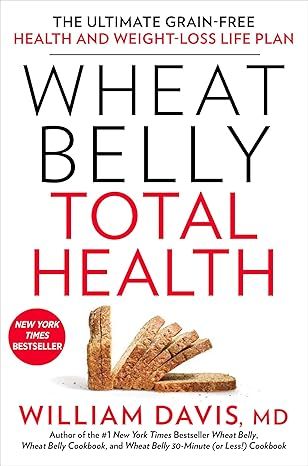
Wheat Belly Total Health: The Ultimate Grain-Free Health and Weight-Loss Life Plan
4.4
-
1,589
$9.99
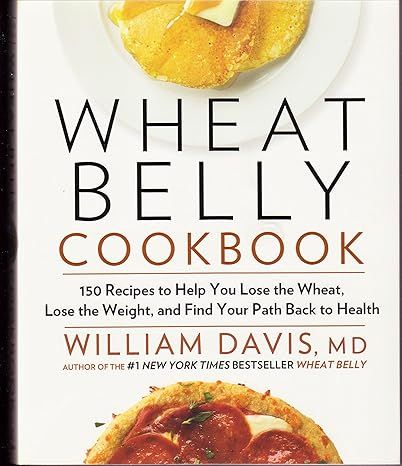
Wheat Belly Cookbook: 150 Recipes To Help You Lose The Wheat, Los
4.4
-
2,474
$1.75
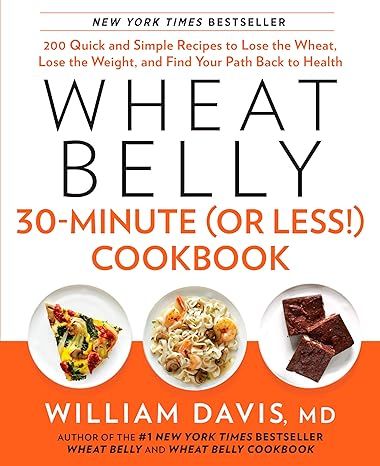
Wheat Belly 30-Minute (Or Less!) Cookbook: 200 Quick and Simple Recipes to Lose the Wheat, Lose the Weight, and Find Your Path Back to Health
4.4
-
2,446
$8.99
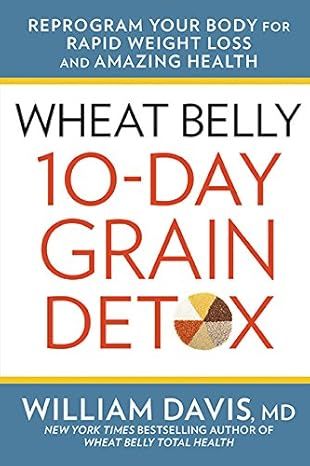
Wheat Belly 10-Day Grain Detox
4.4
-
1,229
$3.94
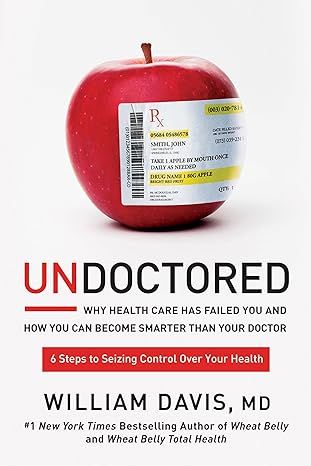
Undoctored: Why Health Care Has Failed You and How You Can Become Smarter Than Your Doctor
4.6
-
1,259
$0.99
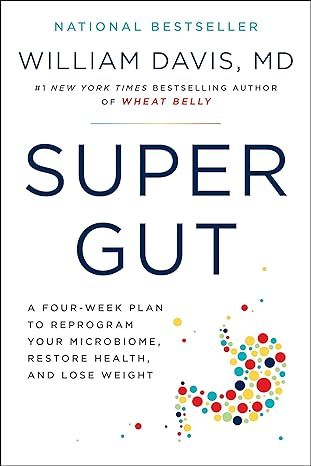
Super Gut
4.6
-
1,959
$0.99
Best Sellers
View all
The Tuscan Child
4.2
-
100,022
$8.39

The Thursday Murder Club: A Novel (A Thursday Murder Club Mystery)
4.3
-
155,575
$6.33

Sapiens: A Brief History of Humankind
4.6
-
140,302
$13.49

The Butterfly Garden (The Collector, 1)
4.3
-
88,556
$9.59

Things We Hide from the Light (Knockemout Series, 2)
4.4
-
94,890
$11.66

The Last Thing He Told Me: A Novel
4.3
-
154,085
$2.99

The Perfect Marriage: A Completely Gripping Psychological Suspense
4.3
-
143,196
$9.47

The Coworker
4.1
-
80,003
$13.48

First Lie Wins: A Novel (Random House Large Print)
4.3
-
54,062
$14.99

Mile High (Windy City Series Book 1)
4.4
-
59,745
$16.19

Layla
4.2
-
107,613
$8.99

The Locked Door
4.4
-
94,673
$8.53
